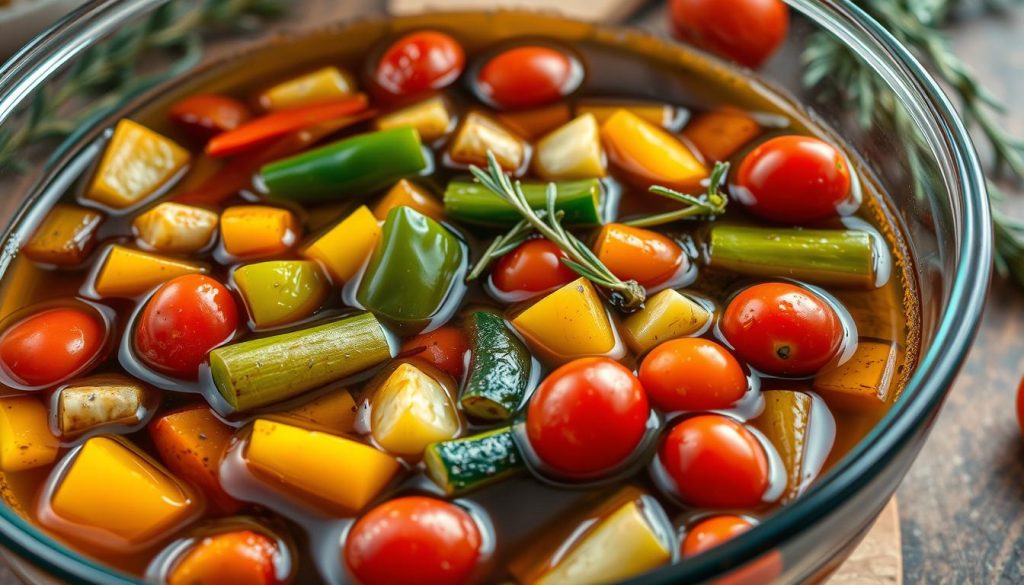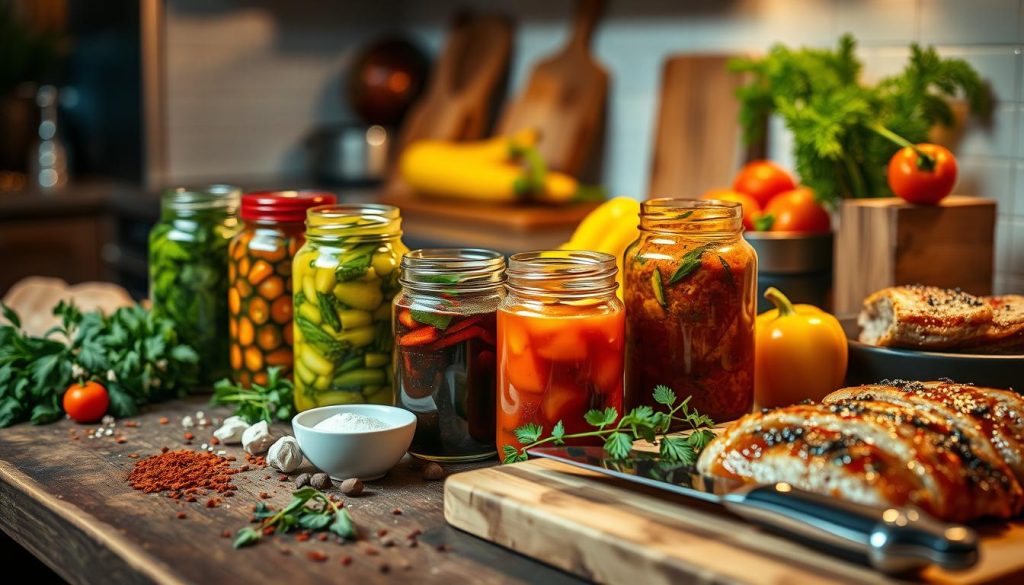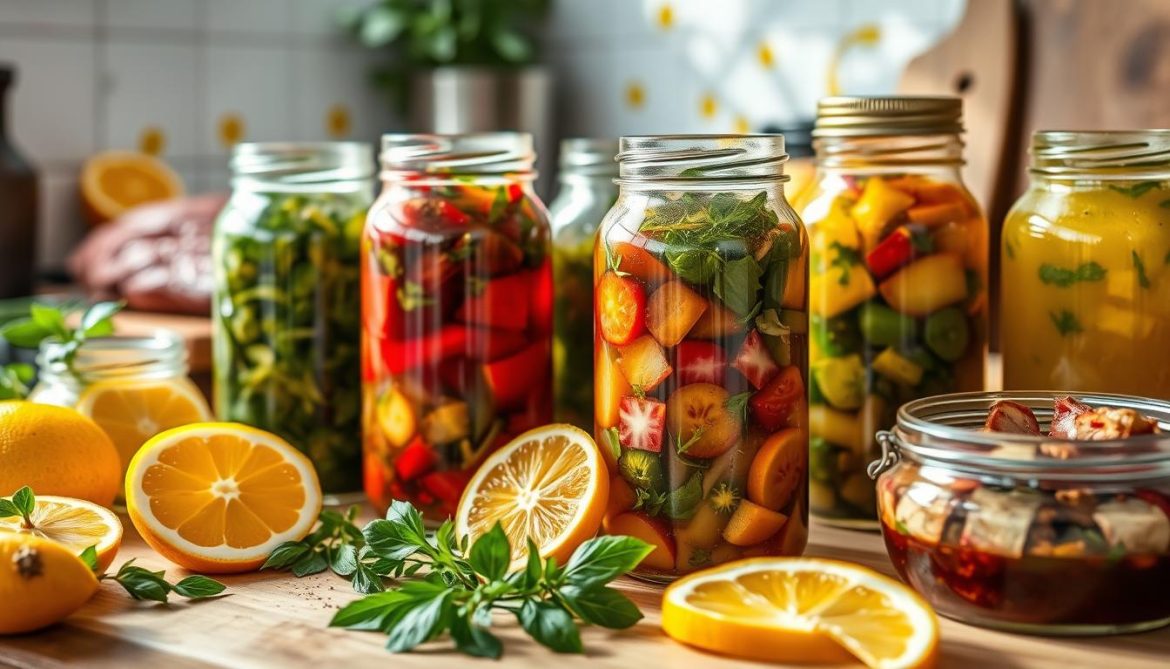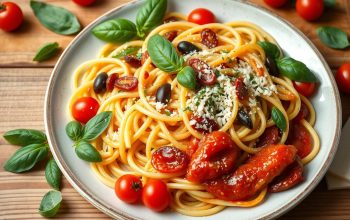Welcome to the ultimate guide on marinating for your New Year’s feast. It’s all about making dishes memorable through flavor and meat prep. Whether you’re a pro or just starting, marinades are key to making your holiday meals special.
Marinating does more than add flavor. It tenderizes meats and infuses them with amazing taste. It turns simple ingredients into unforgettable dishes. From juicy roasts to grilled favorites, the right marinades make your New Year’s celebration stand out.
Both pro chefs and home cooks see marinades as more than a mix of ingredients. They’re a blend of acids, oils, and seasonings that add depth and complexity to every bite.
Key Takeaways
- Marinades transform ordinary ingredients into extraordinary dishes
- Understanding flavor combinations is crucial for perfect marinating
- Different meats require specific marinating techniques
- Marinating can tenderize and enhance food’s natural flavors
- Preparation time varies based on the type of protein and marinade
The Art of Marinating: Essential Techniques for Holiday Dishes
Marinating is like a magic trick in the kitchen. It turns simple ingredients into amazing meals. Learning about different marinating techniques can make your holiday cooking unforgettable. Let’s dive into the science behind making dishes that wow your guests!
To master marinating, you need to know three main types: acid-based, oil-based, and enzymatic marinades. Each type adds special qualities to your cooking. They help make your dishes perfectly seasoned and tender.
Understanding Acid-Based Marinades
Acid-based marinades use citrus juices, vinegar, or wine. They break down protein structures. These marinades are great for:
- Tenderizing tough meat cuts
- Infusing deep flavor profiles
- Reducing cooking time
“The secret to great marinating is balance – too much acid can actually toughen your meat!” – Professional Chef
Oil-Based Marinade Fundamentals
Oil-based marinades carry flavors and protect your ingredients. They are excellent at:
- Locking in moisture
- Distributing herbs and spices evenly
- Creating beautiful caramelization during cooking
Enzymatic Marinade Properties
Enzymatic marinades use natural ingredients like pineapple, papaya, or ginger. They break down proteins. These marinades are powerful for:
- Naturally tenderizing meat
- Introducing complex flavor dimensions
- Working quickly compared to other techniques
Pro tip: Always monitor marinating times to prevent over-tenderizing your ingredients!
Best Cuts of Meat for Holiday Marinating Success
Choosing the right meat is key for great holiday dishes. Each cut needs special care to bring out flavor and tenderness.
Every meat cut needs its own marinating method. Tough cuts like chuck roast and brisket need longer marinating. But, delicate cuts need a gentler touch.
- Tough Cuts (Longer Marinating)
- Beef Brisket
- Pork Shoulder
- Beef Chuck Roast
- Tender Cuts (Shorter Marinating)
- Ribeye Steak
- Tenderloin
- Chicken Breast
Knowing how to prepare meat can turn simple dishes into amazing meals. Enzymatic marinades are great for tenderizing tough meats.
| Meat Cut | Recommended Marinating Time | Seasoning Technique |
|---|---|---|
| Beef Brisket | 12-24 hours | Acidic marinade with herbs |
| Chicken Thighs | 2-4 hours | Yogurt-based marinade |
| Pork Tenderloin | 4-6 hours | Citrus and herb blend |
*Pro Tip*: Always marinate in the refrigerator and never at room temperature to prevent bacterial growth!
By mastering these tips, your holiday meals will be both safe and delicious.
Traditional New Year’s Marinades Around the World
Culinary traditions show the heart of cultural celebrations, like marinating for New Year’s. Each region has its own way of flavoring dishes, making holiday meals special.
Exploring global marinades opens a world of tasty possibilities for holiday cooking. Let’s explore amazing flavor journeys across continents!
Asian-Inspired Festive Marinades
Asian cuisines use vibrant marinating techniques. These marinades combine:
- Soy sauce for umami richness
- Ginger for zesty warmth
- Sesame oil for nutty undertones
- Rice vinegar for tangy balance
Mediterranean Holiday Favorites
Mediterranean marinades use fresh herbs and citrus. They focus on:
- Olive oil as a flavor carrier
- Lemon juice for acidic punch
- Oregano and thyme for aromatic depth
- Garlic for intense flavor
Latin American Celebration Blends
Latin American marinating brings bold, spicy flavors to holiday dishes. Key ingredients are:
- Chili peppers for heat
- Cilantro for fresh green notes
- Cumin for earthy undertones
- Lime juice for bright acidity
“Marinating is not just cooking – it’s storytelling through flavor!” – Chef Maria Rodriguez
| Region | Key Marinade Ingredients | Flavor Profile |
|---|---|---|
| Asia | Soy sauce, ginger, sesame | Umami, complex |
| Mediterranean | Olive oil, lemon, herbs | Fresh, bright |
| Latin America | Chili, cilantro, lime | Bold, spicy |
These global marinating traditions show how seasoning is more than cooking. It’s a celebration of culture and creativity!
Time-Tested Brining Methods for Poultry
Brining turns regular poultry into amazing holiday dishes. This method makes meat juicy and full of flavor, perfect for New Year’s parties. Whether it’s a festive turkey or a tender chicken, brining can make your cooking better.
- Wet Brining: Submerge your poultry in a saltwater solution
- Dry Brining: Rub salt and seasonings directly on the meat surface
Salt is key to tenderizing poultry. It breaks down proteins, keeping meat moist during cooking. This makes your holiday bird juicy and tasty.
“Salt is the secret weapon in transforming ordinary poultry into a culinary masterpiece!” – Professional Chef
Brining Time Guidelines
| Poultry Type | Wet Brine Time | Dry Brine Time |
|---|---|---|
| Whole Chicken | 4-6 hours | 12-24 hours |
| Turkey | 12-24 hours | 24-48 hours |
| Chicken Breasts | 2-4 hours | 6-12 hours |
Remember to keep poultry in the fridge while brining for safety. Rinse it before cooking to get rid of extra salt. This way, you avoid too much saltiness.
Herb-Infused Marinades for Spectacular Results
Unlock the secret to mind-blowing flavors this New Year’s by mastering the art of herb-infused marinating! Fresh herbs can transform ordinary dishes into culinary masterpieces. They bring vibrant seasoning and depth to your holiday cooking.
Herbs are the magical ingredient that elevates marinating from simple seasoning to a true flavor adventure. They bring unique characteristics that can dramatically enhance your dishes. Whether you’re working with meats, vegetables, or plant-based proteins, herbs make a big difference.
Fresh vs. Dried Herb Combinations
Choosing between fresh and dried herbs impacts your marinating strategy. Here’s a quick guide to help you make the best selection:
- Fresh herbs provide bright, intense flavors
- Dried herbs offer concentrated, longer-lasting seasoning
- Combination techniques maximize flavor complexity
When marinating, consider these herb intensity levels:
| Herb Type | Flavor Intensity | Best Uses |
|---|---|---|
| Rosemary | Strong | Red meats, roasted vegetables |
| Thyme | Medium | Chicken, fish, potato dishes |
| Parsley | Light | Seafood, salads, finishing garnish |
Seasonal Herb Pairing Guide
Matching herbs with seasonal ingredients can create extraordinary marinating experiences. Winter calls for robust, warming herbs that complement hearty dishes.
“Herbs are the magical wand that transforms simple ingredients into extraordinary meals!” – Culinary Expert
Pro tip for marinating success: Always crush dried herbs to release their essential oils. Chop fresh herbs finely to distribute flavor evenly. Your taste buds will thank you!
Wine-Based Marinades for Elegant Festivities
Make your New Year’s cooking special with wine-based marinades. They turn simple meat into amazing dishes. Wine marinating is more than a method—it’s an art that adds depth to every bite.
Wine’s role in cooking can really boost your holiday meals. Different wines add unique flavors to your marinades:
- Red wines give bold flavors for hearty meats
- White wines add subtle notes for lighter proteins
- Sparkling wines make zesty marinades
Experts say choose wines you like to drink. The quality of wine affects the taste of your dish.
“Wine is the most civilized thing in the world that enhances the art of marinating.” – Ernest Hemingway (adapted)
Wine Marinade Pairing Guide
| Meat Type | Recommended Wine | Marinating Time |
|---|---|---|
| Beef | Cabernet Sauvignon | 4-6 hours |
| Chicken | Chardonnay | 2-4 hours |
| Pork | Pinot Noir | 3-5 hours |
Remember to refrigerate during marinating. And never use marinade that touched raw meat to keep your food safe.
Quick vs. Long-Term Marinating: What Works Best
Marinating is an art that can turn simple meat into a feast. The secret is knowing the right time and method for each ingredient.
Choosing the right marinating time is crucial. Different meats and ingredients need different approaches. This ensures the best flavor and tenderness.
30-Minute Express Marinades
Short on time? Quick marinades can still add a lot of flavor! Here are some tips for quick marinating:
- Use acidic ingredients like citrus or vinegar to speed up flavor absorption
- Cut meat into smaller pieces to increase surface area
- Choose thin cuts that absorb marinades faster
Overnight Marinating Guidelines
Long-term marinating brings deeper flavors. Here are some key guidelines:
| Meat Type | Maximum Marinating Time | Best Flavor Techniques |
|---|---|---|
| Chicken | 12-24 hours | Yogurt-based marinades |
| Beef | 24-48 hours | Red wine and herb blends |
| Fish | 30 minutes – 2 hours | Citrus and delicate herb marinades |
“The key to great marinating is understanding your ingredients and respecting their unique characteristics!” – Culinary Expert
Pro tip: Always marinate in the refrigerator to prevent bacterial growth and ensure food safety during your meat preparation.
Safety Tips for Marinating During Holiday Prep
Mastering meat preparation during holiday cooking is more than just flavor. Food safety is key to making delicious meals that keep everyone healthy and happy.
Marinating requires understanding safety rules to avoid foodborne illnesses. Raw meats have bacteria risks that need careful handling and smart preparation.
- Always marinate meats in refrigerated environments
- Use clean, non-reactive containers for marinating
- Never reuse marinades that have contacted raw meat
- Maintain internal meat temperatures above 145°F
“Food safety isn’t about perfection, it’s about smart practices that protect your loved ones.” – Professional Chef’s Recommendation
Proper marinating involves controlling temperature and being clean. Refrigeration keeps meats below 40°F, reducing bacterial growth.
| Marinating Practice | Safety Recommendation |
|---|---|
| Refrigeration Temperature | Below 40°F |
| Maximum Marinating Time | 24 hours |
| Container Material | Glass, Ceramic, Stainless Steel |
By following these food safety tips, you’ll make your holiday meat prep worry-free. Delicious food doesn’t have to be risky!
Flavor-Packed Vegetable Marinating Ideas
New Year’s celebrations offer a chance to make your vegetable dishes better. It’s not just about chopping. It’s about turning simple ingredients into amazing dishes.

Marinating vegetables can add amazing flavor. It makes even simple side dishes exciting. Let’s look at some tasty ways to make your holiday veggies unforgettable!
Root Vegetable Marinade Techniques
Root vegetables soak up flavors well, making them taste rich and impressive. Here are some marinating tips:
- Use acidic bases like balsamic vinegar or citrus juices
- Add fresh herbs for bright, aromatic flavors
- Try honey or maple syrup for a touch of sweetness
“The secret to incredible vegetable dishes is understanding how flavoring can transform simple ingredients.” – Culinary Expert
Grilled Veggie Marinade Blends
Grilling vegetables brings out their natural sweetness and creates a nice caramelization. Choose marinades that match different vegetable textures:
- Use strong spices for robust root vegetables
- Go for delicate herb blends for softer veggies
- Try spicy marinades with chili and garlic for bold tastes
With these tips, you’ll make your veggies the stars of your New Year’s feast!
Essential Tools and Equipment for Marinating
Mastering marinating is more than just using great ingredients. The right tools can make your meat preparation stand out. Let’s explore the key equipment that will boost your marinating skills!
Choosing the right tools for marinating is key to your culinary success. Both professional chefs and home cooks use specific gear. This ensures the best flavor and food safety.
Must-Have Marinating Tools
- Non-reactive marinating containers
- Vacuum sealers
- Meat injectors
- Digital kitchen scale
- Specialized brining bags
Choosing the right container is vital for meat preparation. Avoid metal containers that can react with acidic marinades. Glass, ceramic, and food-grade plastic containers are best for keeping flavors intact.
“The right tool can transform a good recipe into an exceptional meal!” – Professional Chef
Comparative Marinating Equipment
| Tool | Best For | Price Range |
|---|---|---|
| Vacuum Sealer | Deep flavor infusion | $50-$200 |
| Meat Injector | Large cuts of meat | $15-$50 |
| Brining Bag | Whole poultry | $10-$30 |
Quality marinating tools don’t have to be expensive. Start with the basics and add more as you grow in your cooking skills.
Pro Tips for Tool Maintenance
- Clean tools immediately after use
- Store in dry, clean spaces
- Replace plastic containers every few years
- Sanitize meat injectors thoroughly
Your marinating journey starts with the right tools. Whether it’s a festive roast or new flavors, these tools will help you make unforgettable meals. Your guests will be impressed!
Dry Rubs vs. Wet Marinades for New Year’s Dishes
Preparing delicious New Year’s dishes is all about two key seasoning methods: dry rubs and wet marinades. Each brings its own special flavors and magic to your holiday meals. Knowing the difference can take your cooking from great to amazing!
“The secret to mouthwatering dishes lies in mastering marinating and seasoning techniques!” – Culinary Experts
Dry rubs and wet marinades have different uses in cooking. Here’s what they’re all about:
- Dry Rubs: Great for intense surface flavoring
- Wet Marinades: Best for deep flavor and tenderizing
Dry rubs are perfect for quick flavor. They make a tasty crust on meats, keeping them moist and flavorful. Made from ground spices and herbs, they’re amazing on beef, chicken, and pork.
| Technique | Best For | Preparation Time |
|---|---|---|
| Dry Rubs | Grilled meats, roasts | 5-10 minutes |
| Wet Marinades | Tough cuts, poultry | 30 minutes – overnight |
Wet marinades are great for tenderizing and adding deep flavors to proteins. By mixing acids, oils, and seasonings, you make a liquid bath that changes your ingredients. They’re perfect for tougher meats, making them tender and flavorful.
Pro tip for New Year’s cooking: Try both methods! Use dry rubs with a quick wet marinade for amazing, layered flavors. Your guests will love it!
Make-Ahead Marinade Recipes for Busy Holidays
Holiday cooking can be overwhelming. But, using smart meal prep strategies can change your kitchen experience. Marinades are a secret weapon for making delicious dishes quickly during the festive season.

Preparing marinades ahead of time makes holiday cooking easier and less stressful. With some planning, you can make tasty dishes that wow your guests without spending hours cooking.
Freezer-Friendly Marinade Options
Freezer-friendly marinades are a big help for holiday meal prep. Here are some great options:
- Citrus-herb chicken marinade
- Garlic-soy beef marinade
- Rosemary-wine pork marinade
Bulk Preparation Strategies
Here are ways to make your holiday cooking more efficient:
- Make marinades in big batches
- Store them in vacuum-seal bags
- Mark containers with the prep date
| Marinade Type | Storage Time | Recommended Proteins |
|---|---|---|
| Citrus-Based | Up to 2 weeks | Chicken, Fish |
| Oil-Based | Up to 1 month | Beef, Lamb |
| Yogurt-Based | Up to 3 days | Pork, Vegetables |
“Preparation is the key to stress-free holiday cooking!” – Professional Chef Recommendation
Pro tip: Always store marinades in airtight containers. Keep them in the coldest part of your fridge or freezer for the best flavor and quality.
Troubleshooting Common Marinating Mistakes
Marinating can be tricky, even for experienced home cooks. Knowing common mistakes helps you make delicious New Year’s dishes. Over-marinating can make proteins tough and stringy.
Be careful with acidic marinades like lemon juice or vinegar. These can be too harsh for delicate proteins like fish and chicken. Beef and pork can handle longer times, but there’s a limit. Seafood needs 15-30 minutes, while chicken works best between 2-6 hours.
Uneven flavor can happen if ingredients aren’t prepared right. Make sure meat surfaces are dry before marinating. Use resealable bags or non-reactive containers for even coverage. Rotate or massage proteins to prevent bland spots in your holiday meal.
Salt is key in marinating. Too much salt can make meat dry and tough. Choose marinades with balanced salt and use kosher or sea salt for better control. Patience and detail will improve your marinating skills, making your holiday cooking stand out.



